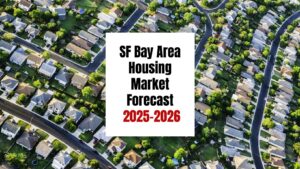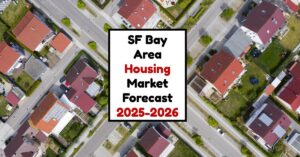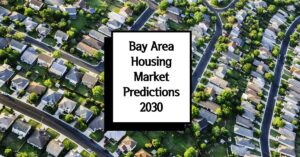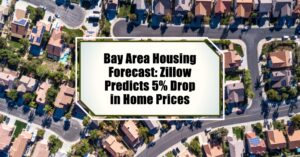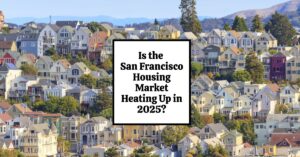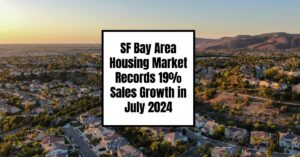As we forge ahead, experts are making San Francisco Bay Area housing market predictions for 2025 and 2026 that reveal a gradual transformation. The Bay Area real estate scene has been a hotbed of activity and speculation, and there's a lot to unpack as we consider what the future holds.
With prices that can make your head spin, understanding the future is crucial, whether you're dreaming of buying, planning to sell, or just trying to keep up with the neighborhood. So, will those exorbitant prices finally drop? Are we headed for a crash? Well, here's the short answer: experts currently predict a decline in the Bay Area housing market over the next year.
The latest forecast suggests a drop of around 6.1% in home prices by June 2026. However, understanding the nuances of this forecast requires a deeper dive, and that's exactly what we'll do in this article.
I've been watching the Bay Area market for years, and let me tell you, it's never boring. It's a complex beast influenced by everything from tech booms and interest rates to migration patterns and, of course, good old-fashioned supply and demand. So, let's unpack what the next couple of years might hold for those of us hoping to buy, sell, or simply stay put in this coveted corner of California.
Bay Area Housing Market Forecast for the Next 2 Years: 2025-2026
Key Takeaways
The Current State of Play
First, let's get a snapshot of where things stand right now (as of late June 2025):
- Average Home Value: According to Zillow, the average home value in the San Francisco-Oakland-Hayward area is $1,152,144. This is down by 2.5% compared to this time last year.
- Homes for Sale: There are currently 9,974 homes on the market.
- New Listings: 3,880 new homes were listed recently.
- Sale to List Ratio: The median sale to list price ratio is 1.016. This means that, on average, homes are selling for slightly above their asking prices.
- Median Sale Price: The median sale price is currently $1,189,500.
- Median List Price: The median list price hovers at $998,333.
- Sales Over List: About 61.5% of homes are selling for more than their listing price.
- Sales Under List: Conversely, 29.8% of homes sell at a discount.
- Days to Pending: It takes a median of 17 days for a listing to go pending (meaning an offer has been accepted).
So, what does all this mean? Well, we're seeing a market that's still relatively competitive, with many homes selling above list price. However, the fact that the average home value is declining year-over-year tells us that the market isn't as hot as it was a year ago. The increase in inventory (homes for sale) suggests that buyers have more options and aren't feeling as much pressure to overbid.
Breaking Down the Bay Area Housing Market Forecast
Now, let's look at what the experts at Zillow are predicting for the near future:
| Forecast Period | Predicted Change |
|---|---|
| July 31, 2025 | -1.0% |
| September 30, 2025 | -3.2% |
| June 30, 2026 (1-Year) | -6.1% |
This data suggests that the Bay Area housing market forecast indicates a continued decline in home values. While the immediate drop isn't huge, the one-year forecast paints a picture of more significant softening. Why is this happening? Several factors likely contribute:
- Affordability Crisis: The Bay Area is notoriously expensive. High home prices, combined with rising interest rates, make it difficult for many people to afford a home here.
- Tech Industry Shifts: The tech industry, a major driver of the Bay Area economy, has seen layoffs and a shift towards remote work. This could be reducing demand for housing in certain areas.
- Higher Interest Rates: Interest rates have been on the rise after historic lows, this translates to less affordability, which in turn reduces the potential pool of buyers.
- Fear of Recession: The global economy is unpredictable and the fear of a recession has gripped the market leading to lower buyer activities.
How Does the Bay Area Forecast Compare With Other Regions?
Let's see how the Bay Area housing market forecast stacks up against other major metropolitan areas in California:
| Region | 1-Month (July 2025) | 3-Month (Sept 2025) | 1-Year (June 2026) |
|---|---|---|---|
| San Francisco, CA | -1.0% | -3.2% | -6.1% |
| Los Angeles, CA | -0.4% | -0.9% | -1.3% |
| Riverside, CA | -0.5% | -1.3% | -0.9% |
| San Diego, CA | -0.7% | -2.1% | -1.5% |
| Sacramento, CA | -0.7% | -2.1% | -3.7% |
| San Jose, CA | -1.0% | -2.6% | -4.0% |
| Fresno, CA | -0.3% | -1.0% | -1.2% |
| Bakersfield, CA | -0.3% | -0.8% | -0.1% |
As you can see, the San Francisco Bay Area is expected to experience a more pronounced decline compared to most other major cities in California. San Jose has a relatively similar forecast, facing the same challenges with tech shifts and sky-high costs. This further reinforces the idea that unique regional factors are influencing the Bay Area housing market.
National Outlook: A Brighter Picture?
Now, let's broaden our view and look at the national housing market forecast, with insights from the National Association of Realtors (NAR) Chief Economist, Lawrence Yun. Yun believes that “brighter days may be on the horizon” for the U.S. housing market. Here's what he's predicting:
- Existing Home Sales: Expected to increase by 6% in 2025 and a whopping 11% in 2026.
- New Home Sales: Projected to rise by 10% in 2025 and another 5% in 2026. This growth in new construction could help ease supply issues across the country.
- Median Home Prices: Forecasted to increase modestly by 3% in 2025 and 4% in 2026. This suggests a return to more sustainable price appreciation.
- Mortgage Rates: Anticipated to average 6.4% in the second half of 2025 and dip to 6.1% in 2026. Yun sees mortgage rates as a “magic bullet” for the market, making homes more affordable and boosting demand.
So, while the Bay Area is facing a potential downturn, the national forecast is generally positive. This highlights the localized nature of real estate markets. Factors like job growth, migration patterns, and local regulations can significantly impact housing prices in a specific area, irrespective of the national trend.
Will The Bay Area Housing Market Crash? My Take
Okay, this is where I give you my personal opinion, based on the data and my understanding of the Bay Area. I don't think we're headed for a full-blown crash. While prices may continue to decline, I expect it to be a gradual correction rather than a sudden collapse. Here's why:
- Limited Supply: The Bay Area still has a fundamental shortage of housing. It is difficult to build new homes due to strict zoning regulations, environmental concerns, and NIMBYism (“Not In My Backyard”). This limited supply will help to cushion any price declines.
- Strong Economy (Despite Recent Shifts): The Bay Area's economy, while undergoing changes, is still incredibly strong. The region still has a major concentration of tech companies, venture capital, and innovation. This will continue to attract high-income earners who can afford to buy homes in the area.
- Desirability: The Bay Area continues to be a desirable place to live for many people. It offers a rich culture, beautiful scenery, and access to world-class universities and research institutions. This desirability will help to support housing prices in the long run.
However, I do expect to see some continued downward pressure on prices, especially in the short term. As a homeowner or potential buyer it’s important to stay informed.
Looking Ahead: Potential Bay Area Housing Market Forecast for 2026
Predicting the future is always tricky, but based on current trends, here's my best guess for the Bay Area housing market forecast in 2026:
- Price Stabilization: I believe we'll see prices begin to stabilize towards the end of 2026. The market will likely find a new equilibrium where homes are more affordable, but still relatively expensive compared to other parts of the country.
- Increased Inventory: As prices soften, we may see more homeowners decide to sell, further increasing the supply of homes on the market. This could give buyers even more negotiating power.
- Mortgage Rate Impact: Lawrence Yun's prediction for mortgage rates to dip to 6.1% by 2026 could certainly spur activity in the market.
- Local Policies:* Any change to local housing policies and regulations can have a significant effect on the market.
Factors Influencing the Bay Area Housing Market
What’s leading the forecasted shifts in the housing market? Several key factors are at play:
- Interest Rates:
- Interest rates have a significant influence on the housing market. As rates climb, the number of potential buyers tends to decline since higher borrowing costs make homes less affordable. This reduction in demand can lead to slower price growth and potentially declining prices.
- Economic Conditions:
- Economic indicators, such as inflation and consumer confidence, directly affect real estate. With inflation under watch and national economic conditions fluctuating, buyers are likely becoming more cautious, waiting for a clearer picture before jumping into the market.
- Tech Industry Performance:
- The Bay Area is synonymous with tech innovation, and the fluctuations within this industry can dramatically affect housing demand. When tech stocks soar, so does the confidence of potential homebuyers. Conversely, if the tech sector experiences layoffs or declines, this will likely cool buyer interest.
- Demographics and Lifestyle Shifts:
- Many younger generations are choosing to rent instead of buy due to prohibitive home prices. The shift towards remote work has also affected where people choose to live, as some are opting for more affordable areas rather than sticking to high-cost regions.
- Local Policy Adjustments:
- Local housing policies, particularly those aimed at creating affordable housing, can significantly impact the market. Policy changes may reshape housing supply and influence price trajectories directly.
So, Will the Bay Area Housing Market Crash in the Coming Years?
Here’s the big question that's probably on everyone's mind: Is a housing market crash imminent in the Bay Area? I don't think so. A crash implies a sudden and dramatic collapse in prices, and that's not what the data is suggesting.
Several factors mitigate against a crash:
- Strong Economy: While the tech industry has seen some layoffs, the Bay Area economy is still relatively strong.
- Limited Housing Supply: The Bay Area has a chronic shortage of housing. This scarcity helps to support prices, even in a cooling market.
- High Demand (Long Term): Despite out-migration, the Bay Area remains a desirable place to live and work. This sustained demand will likely prevent a major price collapse.
Therefore, I believe the Bay Area housing market will remain resilient in the coming years. While we might not see the crazy appreciation of the past, the area's unique appeal and strong economic base will continue to support prices.
“Invest in Turnkey Rental Properties”
Discover high-quality, ready-to-rent properties designed to deliver consistent returns.
Contact us today to expand your real estate portfolio with confidence.
Contact our investment counselors (No Obligation):
(800) 611-3060
Also Read:
- Bay Area Housing Market Predictions 2030
- Bay Area Housing Market: What Can You Buy for Half a Million?
- Bay Area Home Prices Skyrocket: Wealthy Buyers Fuel Market
- Bay Area Housing Market: Prices, Trends, Forecast
- Bay Area Housing Market Booming! Median Prices Hit Record Highs
- Most Expensive Housing Markets in California
- SF Bay Area Housing Market Records 19% Sales Growth
- Bay Area Housing Market Heats Up: Home Prices Soar 11.9%
